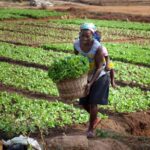Togo is strengthening its capacity to address animal health threats through a training program for animal health professionals. Twenty professionals began training in Kpalimé on Monday, May 5, 2025, focusing on the prevention and containment of avian and swine flu epidemics.
The initiative, supported by the Food and Agriculture Organization of the United Nations (FAO) through its ISAVET program, aims to build resilience within local veterinary systems.
“Good management of animal crises at the grassroots level improves food security, stabilizes livestock farmers’ incomes, and prevents health risks for the entire population,” stated Dr. Lamboni Matéyendou, Secretary General of the Ministry of Livestock. The overarching goal is to control animal epidemics to protect livestock, the food economy, and public health.
Read more: Togo: INPIT Inveils New Visual Identity.
The training program consists of two phases: a four-week theoretical core, divided into two sessions, followed by a three-month field internship. During the internship, the technicians will apply their newly acquired skills in their respective communities, guided by mentors.
“Ultimately, the objective is to build a national network of veterinary watchdogs capable of quickly detecting disease outbreaks and intervening effectively,” emphasized Diwa Oyetunde, program officer at FAO Togo.

















